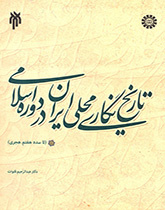
Local Historiography in Iran During the Islamic Period (Until 7th Century)
This book examines the local historiography in Iran until 7th century and recognizes the factors of the beginning and continuation of this style of historiography, its stages of growth and prosperity, types and courses. According to studies, local historiography of Iran began in the second century AH and, contrary to popular belief, the political factor and the formation of local governments in different parts of Iran did not play an important role in its beginning. This type of historiography continued to exist until the seventh century AH in two general fields: 1. Local histories; 2. Local biographies; Local histories, which themselves went through three different periods by the end of the seventh century AH, are works that more or less followed the pattern of historical books in the general sense, and usually contain information about various aspects of the history of a city or an area. Monographs related to the conquest of cities and regions of Iran, books of virtues and works that deal with different aspects of the history of a city or region, constitute three main types of local histories, each of which has different time periods. Local biographies, the writing of which began in the middle of the third century AH, are works whose main subject is the biographies of the figures and personalities of a particular city or region. Most of these works are the most distant local Iranian histories from the institution of politics, and we have no indication of the influence of governments in the beginning or continuation of the writing of such books. There are two types of local biographies, religious and non-religious. Local religious biographies are mainly devoted to the biographies of religious scholars, especially the narrators of a particular city or region, but in the non-religious type, the biographies of governors, aristocrats, poets, and scholars in general are discussed. The ups and downs of writing local Iranian histories up to the seventh century AH show complete harmony with the rise and fall of Islamic civilization and reveal that with the prosperity of science and knowledge in this area and instability in the pillars of Islamic society, writing local histories lost their prosperity.
Selected Book of the 1st Dehkhoda Badge Festival, 2015
Highly-Praised in the 6th Book Awardin Religion and Best Research, 2016




